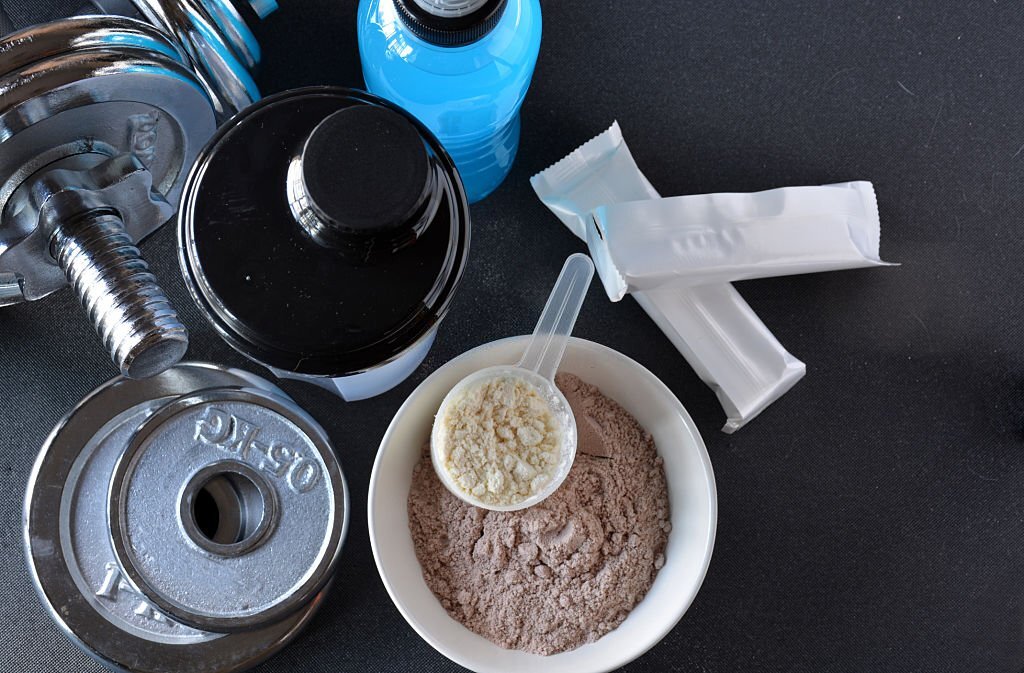Are you Team Nitrate or Team Monohydrate? Well, get ready for a showdown between two titans of the supplement world: creatine nitrate vs monohydrate! These two forms of creatine have been battling for years, with athletes and fitness enthusiasts debating which one reigns supreme.
So grab your shaker bottle because things are about to get exciting between creatine nitrate and monohydrate.
Creatine Nitrate vs. Monohydrate: What’s The Difference?
Creatine nitrate and monohydrate are two of the popular form of creatine people use to boost their muscles and performance. While creatine monohydrate is the most widely studied form of creatine, consisting of a creatine molecule bound to a water molecule, creatine nitrate consists of a creatine molecule bound to a nitrate group.
But how do they differ from each other?
Here’s a table outlining the key differences between creatine nitrate and creatine monohydrate.
| Property | Creatine Nitrate | Creatine Monohydrate |
| Chemical structure | Creatine molecule bonded with nitrate molecule. | Creatine molecules bonded with one water molecule. |
| Solubility | Highly soluble in water. | Moderately soluble in water. |
| Absorption | Absorbed more quickly and efficiently by the body due to the nitrate component. | Absorbed more slowly by the body. |
| Dosage | 1-3 g of creatine nitrate per day is a safe dosage due to its increased absorption efficiency. | A daily intake of 3-5 g of creatine monohydrate is considered safe. |
| Cost | More expensive due to the patented process. | Less expensive and widely available. |

Are There Any Similarities Between Creatine Nitrate And Monohydrate?
Here are some similarities:
- Both creatine nitrate and creatine monohydrate help to enhance performance, increase muscle mass, and improve strength.
- Both forms of creatine may increase muscle phosphocreatine (PCr) levels, which helps regenerate Adenosine triphosphate (ATP) through creatine kinase. This boost in PCr improves muscle performance during high-intensity exercise and increases strength and endurance.
- Both creatine nitrate and creatine monohydrate may have similar side effects, such as stomach discomfort, diarrhea, and nausea. However, these side effects are generally mild and can be avoided by following the recommended dosage.
- Both are water-soluble and can be easily mixed with water or other beverages.
Find out what you can mix with creatine.
Pros And Cons Of Using Creatine Nitrate For Workouts
Well, there is limited research on the benefits and drawbacks of using creatine nitrate compared to creatine monohydrate. However, based on the available information, here are some general pros and cons of creatine nitrate supplementation for workouts.
Pros
- Creatine nitrate has higher water solubility than creatine monohydrate, which may lead to better absorption and utilization by the body.
- Some users report less water retention and bloating with creatine nitrate than with creatine monohydrate.
- It can improve endurance performance and cardiovascular health, so combining creatine with nitrate may provide additional benefits beyond those of creatine monohydrate alone.
Cons
- Creatine nitrate is a relatively new supplement, and there is limited research on its effectiveness and safety compared to creatine monohydrate.
- Creatine nitrate is often more expensive than creatine monohydrate, which may be a drawback for some users.
- It may cause gastrointestinal issues such as bloating and diarrhea.
- It is not recommended for individuals with certain medical conditions, such as kidney disease.
Pros And Cons Of Using Creatine Monohydrate For Workouts
Below are some pros and cons of utilizing creatine monohydrate for exercise.
Pros
- Creatine monohydrate can increase muscle strength and power, making it easier to perform high-intensity workouts and lift heavier weights.
- It has improved exercise performance, particularly during high-intensity, short-duration exercise.
- It can increase muscle mass and improve muscle recovery, making it a popular supplement for bodybuilders and strength athletes.
- Creatine monohydrate is generally considered safe and well-tolerated, with few side effects reported.
- It is a water-soluble supplement that is easy to mix with water, juice, oats, etc.
Cons
- As creatine monohydrate can cause water retention, it may lead to temporary weight gain and bloating.
- Some people may experience digestive issues such as stomach discomfort, diarrhea, and nausea when taking creatine monohydrate.
- While creatine monohydrate is effective for many people, some individuals may not experience any benefits from taking it. Creatine is metabolized and eliminated by the kidneys, and individuals with kidney issues may be at risk of experiencing adverse side effects.
- Creatine monohydrate may interact with certain medications, such as diuretics and nonsteroidal anti-inflammatory drugs (NSAIDs).
- Creatine monohydrate may not be necessary for everyone, particularly those not engaging in high-intensity exercise.
Creatine Nitrate vs. Monohydrate: Which One is Best for You?
When choosing between creatine nitrate and creatine monohydrate, there are a few factors to consider. Both supplements have been shown to increase strength, power, and muscle mass but differ in their chemical makeup and effects on the body.
Creatine monohydrate is the most widely studied and used form of creatine. It is safe and effective for enhancing athletic performance, especially during high-intensity and short-duration activities like weightlifting and sprinting.
On the other hand, creatine nitrate is a newer form that combines creatine with nitric oxide. This combination has been shown to increase blood flow and oxygen delivery to the muscles, which may enhance athletic performance. Further, it is claimed to be more soluble than creatine monohydrate and may be absorbed more quickly by the body.
Learn the science behind creatine and water solubility.
Though some studies have suggested that creatine nitrate may provide similar benefits to creatine monohydrate, there is limited research on the effectiveness of creatine nitrate.
So, the best choice for you depends on your personal preferences, goals, and any health considerations you may have.
If you’re looking for a well-studied and effective supplement that athletes have used for decades, creatine monohydrate is a great choice. Creatine nitrate is worth considering if you’re looking for a newer option that may provide additional benefits and is easier on the stomach.
But be sure to research, talk to your healthcare professional, and choose a high-quality supplement from a reputable brand.

Is It Safe To Take Both Creatine Nitrate And Monohydrate Together?
There is no evidence to suggest that taking creatine nitrate and monohydrate together is unsafe, but it may not provide any additional benefits. However, there is limited research comparing the effectiveness of the two forms and their combination.
So, you should follow recommended dosages for supplements and consult a healthcare professional, especially if you have health conditions or take medication.
FAQs
Is creatine nitrate better than monohydrate?
No clear evidence suggests that creatine nitrate is superior to creatine monohydrate. While some studies have shown the potential benefits of creatine nitrate, more research is needed to determine its efficacy compared to creatine monohydrate, which remains the most widely studied and effective supplementation.
Is creatine nitrate worth it?
Creatine nitrate has shown promise in enhancing muscle efficiency and oxygenation, potentially improving performance. It may also improve muscular endurance and blood flow to muscles during exercise. However, further research is needed, and consulting with a healthcare provider before use is recommended.
What is the best form of creatine?
The best form of creatine is subjective and depends on individual goals and tolerances. Creatine monohydrate is the most researched and widely used form, while some individuals may tolerate creatine HCl or CEE better. However, consistency and comfort are key in choosing the best form of creatine.
Final Words
So, creatine Nitrate vs. Monohydrate: which one should you choose for maximum gains?
Both supplements have been shown to offer potential benefits for improving exercise performance. So, whether you’re a hardcore athlete or a fitness enthusiast, research, consult a healthcare provider, and choose the creatine supplement that’s right for you. You can elevate your performance and achieve your fitness goals with the right choice.
Visit our blogs to learn more about effective supplementation.

I started my professional career as a sports medicine consultant in Rola, Missouri. My primary role was to suggest suitable supplements for my patients according to their pre-existing conditions and lifestyle goals. I believe a healthy lifestyle is the most important if you want to make your life really meaningfull.

